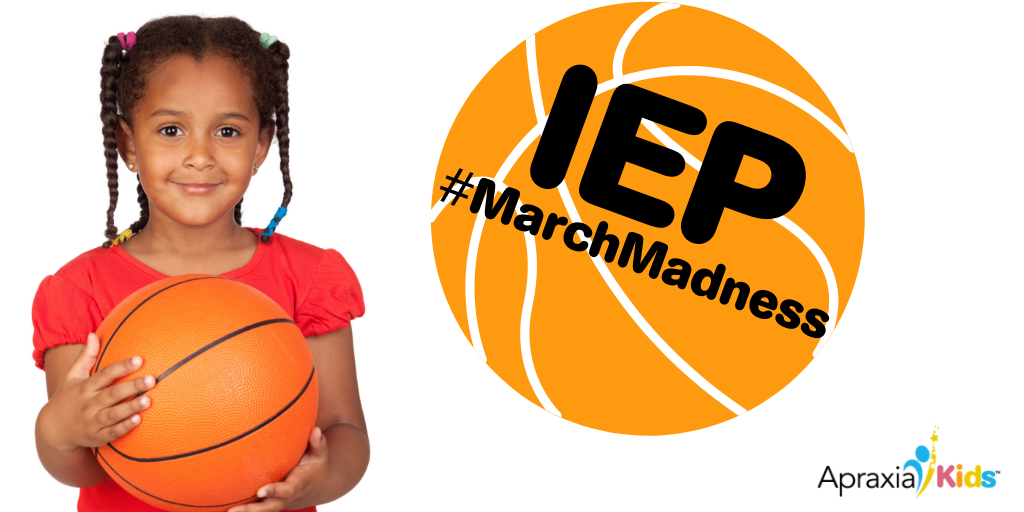
14 Mar IEP March Madness!
IEP March Madness!
Apraxia Kids
It’s #MarchMadness and this month we are sharing TONS of information on IEPs on our social media! We’ve received overwhelming feedback about how helpful these posts have been to our social media followers, and wanted to compile them for parents to continue to use in the future! Check out this full list of helpful tips and resources to help you prepare for your child’s next IEP meeting!

What is an IEP? An individualized education plan (IEP) is a written plan that spells out the specific types of help that a student will receive. With an IEP, your child will get individualized instruction that focuses on improving specific skills, including accommodations and modifications.
Having an IEP gives you and your child certain legal protections, too. It allows you to be involved in decisions that impact your child’s education and learning goals.
Read more here: https://www.understood.org/en/school-learning/special-services/ieps/what-is-an-iep
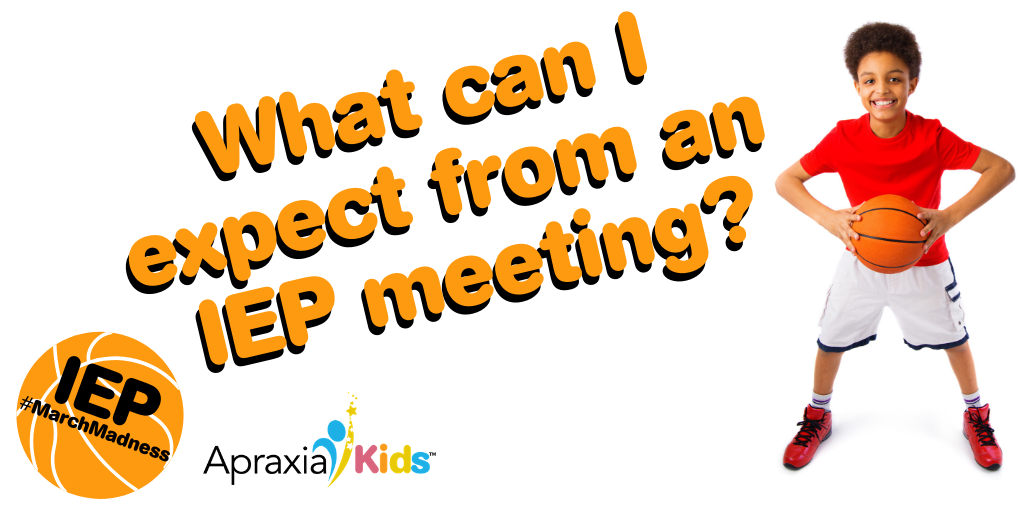
“What can I expect from an IEP meeting?” This is a question that many parents ask prior to their first IEP meeting. Knowing who attends, what is discussed/decided, and what actions will be required before the meeting can help ease parents’ nerves.
Check out this guide that can help prepare you for what to expect from your first IEP meeting!
https://www.understood.org/en/school-learning/special-services/ieps/the-iep-meeting-an-overview
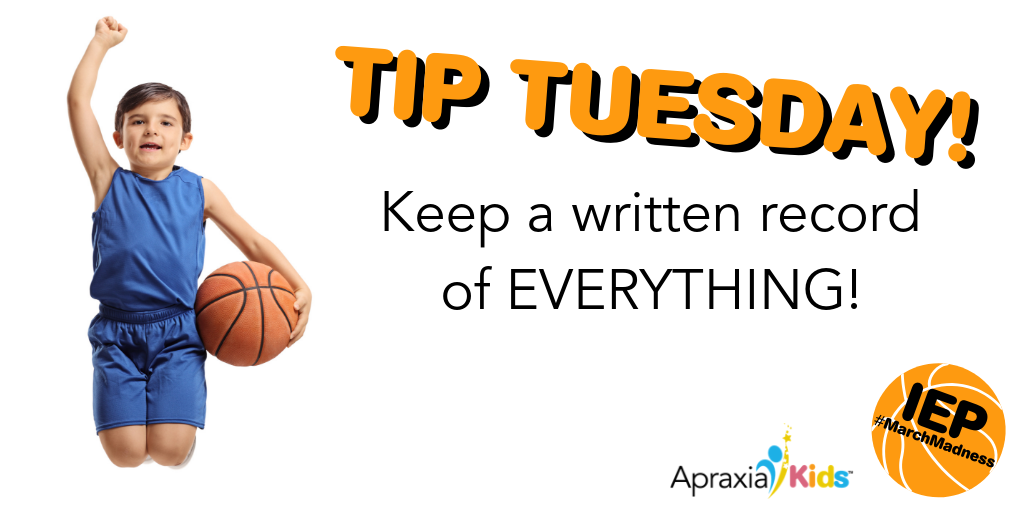
Tip Tuesday! We asked our community what their top-tips for IEP meetings are, and one common tip was, “Keep a written record of everything!” Additionally, if something is said at an IEP meeting, you can request that a written copy of any decision is provided to you.
Understood.org has a variety of free downloads, including an IEP Binder Checklist and a Communication Log. Check it out!
https://www.understood.org/en/school-learning/special-services/ieps/download-iep-binder-checklist
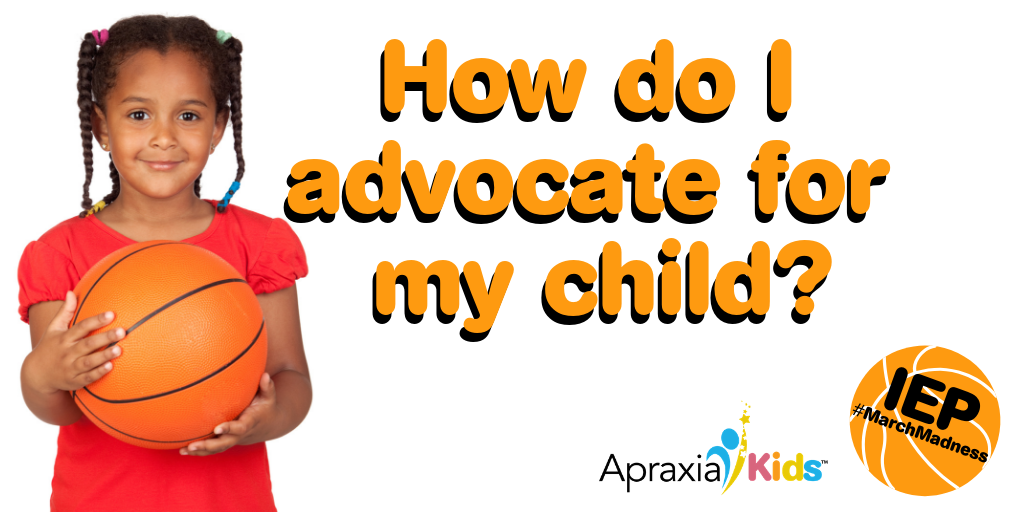
Where do I get started in advocating for my child? As a parent, your responsibility is to ensure that the decisions made are what is best for your child – but how do you know where to start?! This guided worksheet from Understood.org can help you organize your thoughts about what your child should be receiving through the schools. Writing down your thoughts prior to the meeting can help you clear your head and keep a record of everything you want to say during the meeting.
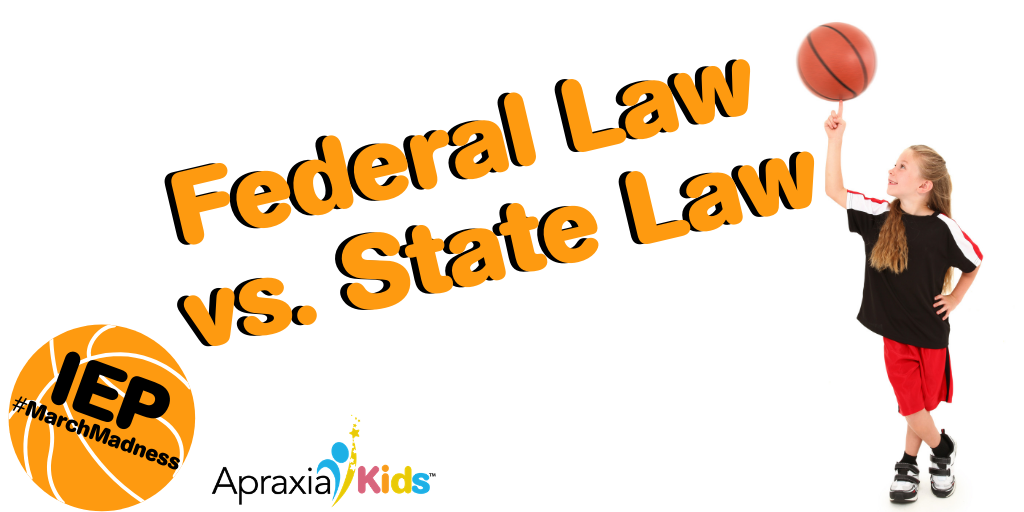
What is the difference between Federal Law and State Law? Every student who gets special education is covered by the Individuals with Disabilities Education Act (IDEA). That federal law spells out what all states must do to meet the needs of students with disabilities. But in many areas, IDEA leaves room for states to interpret the rules and pass their own laws on how to apply them.
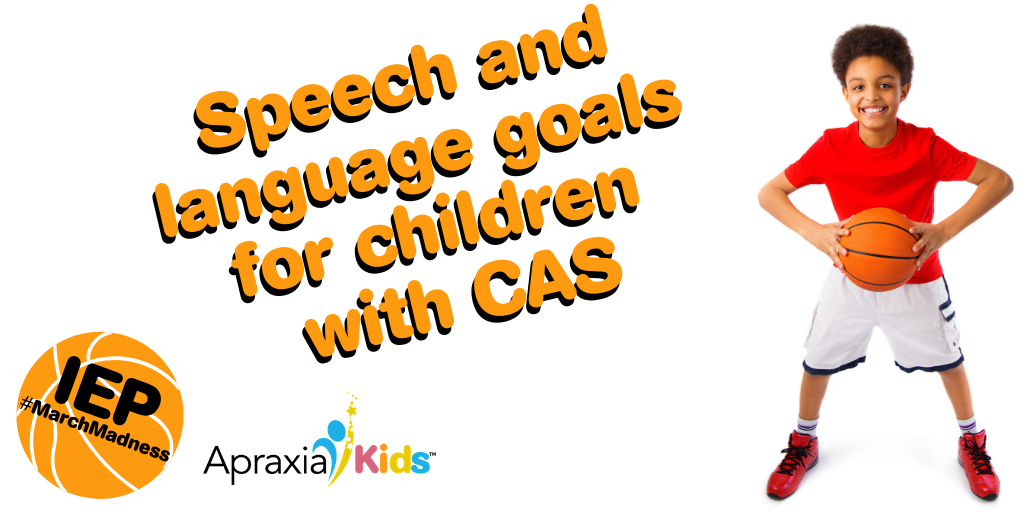
What type of speech and language goals should be considered when planning an IEP for a child with apraxia? Learn more about how short and long term IEP goals should be written for children with apraxia of speech!
https://www.apraxia-kids.org/apraxia_kids_library/individualized-education-plans-ieps/
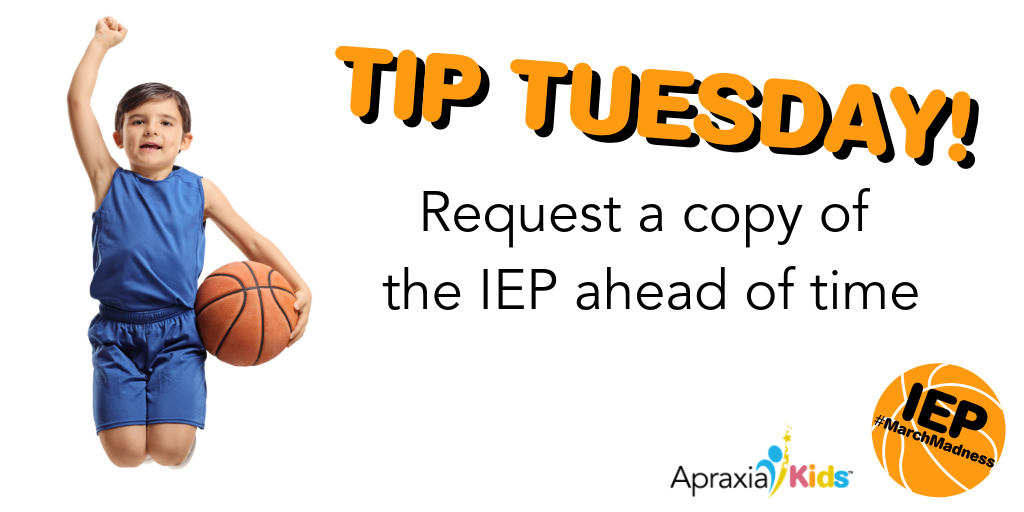
Tip Tuesday! Did you know you can request a copy of your child’s IEP ahead of time? This way, you can read over the IEP, ask opinions of your support network, and prepare questions before you arrive at the IEP meeting.
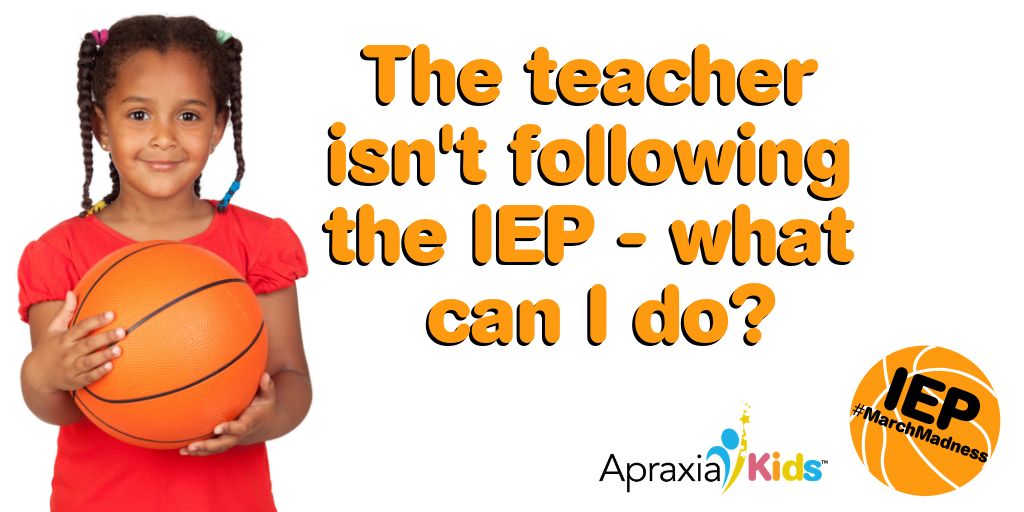
What do you do when your child’s teacher isn’t following the IEP? It’s a good idea to meet with the teacher as soon as possible, and make the meeting conversational rather than confrontational. If your meeting with the teacher is unsuccessful, you should document what has happened and raise your concerns to the school administrators.
Read more about how you can ensure that the IEP is being met: https://www.understood.org/en/school-learning/special-services/ieps/the-teacher-isnt-following-my-childs-iep-what-can-i-do
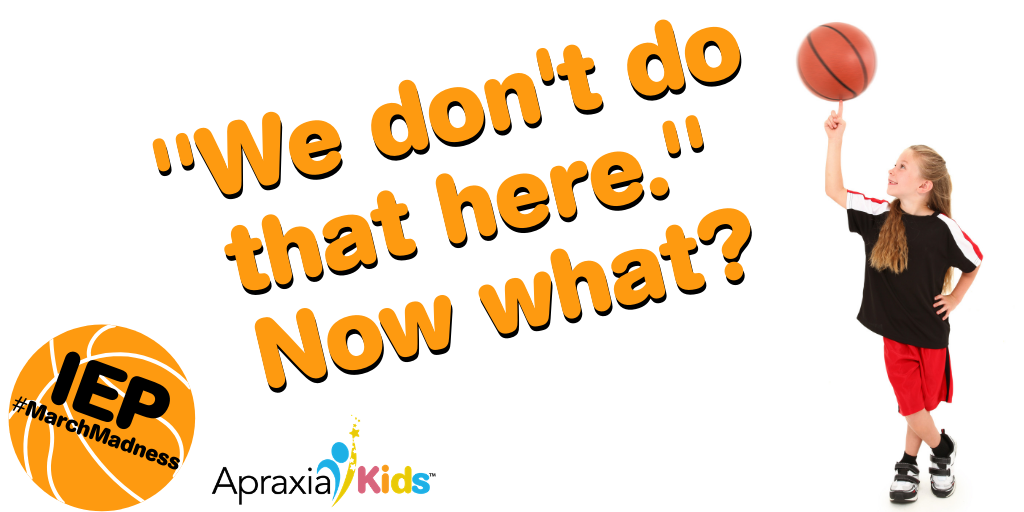
What do you do when you’ve asked for something to be included on your child’s IEP and the school says “We don’t do that here”? This mom shares her experience with being told no, and urges parents to take further actions if an appropriate request that is necessary for the child is being denied. Remember that the “I” in IEP means “individual,” so the school should provide individualized services when appropriate.
Read more!: https://adayinourshoes.com/what-to-do-when-school-says-we-dont-do-that-here/
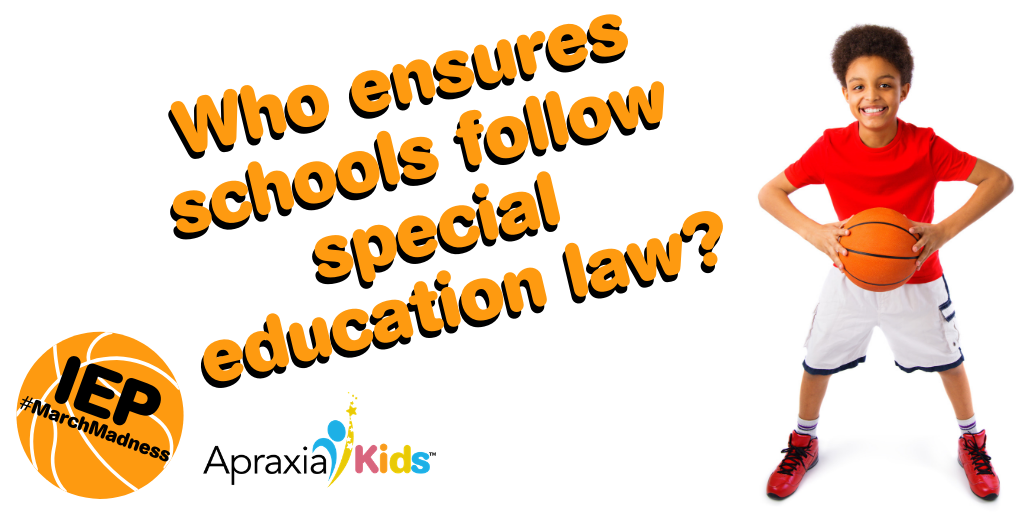
The main law that covers special education is the Individuals with Disabilities Education Act (IDEA). IDEA requires schools to have what’s called an “agency representative” on the IEP team. This person is responsible for seeing that your child gets the supports and services as written in his or her IEP. If you don’t feel the school is following your child’s IEP, contact the agency representative or file a complaint with the state department of education.
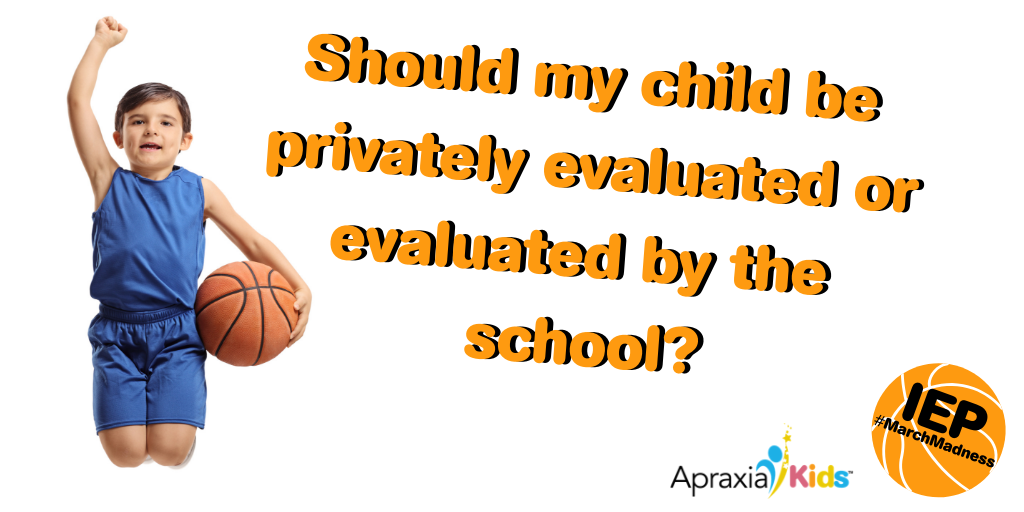
“Should my child be privately evaluated or evaluated by the school?” There are pros and cons for considering who should evaluate your child. This full chart from Understood explains in detail everything you should consider:
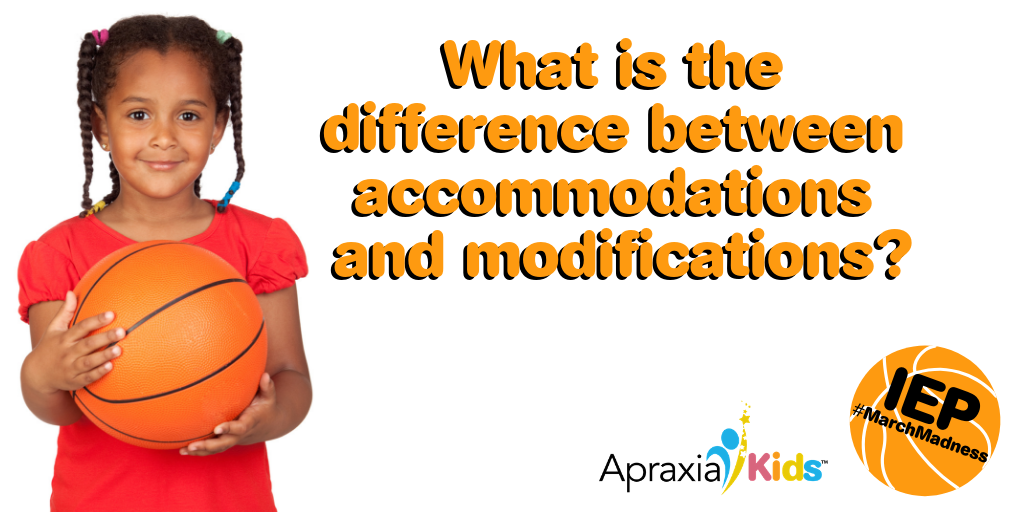
What is the difference between accommodations and modifications? Accommodations change how a student learns the material. A modification changes what a student is taught or expected to learn.
How do accommodations and modifications impact different aspects of your child’s education, like classroom instruction, tests, art class, and more? Check out this full chart from Understood:
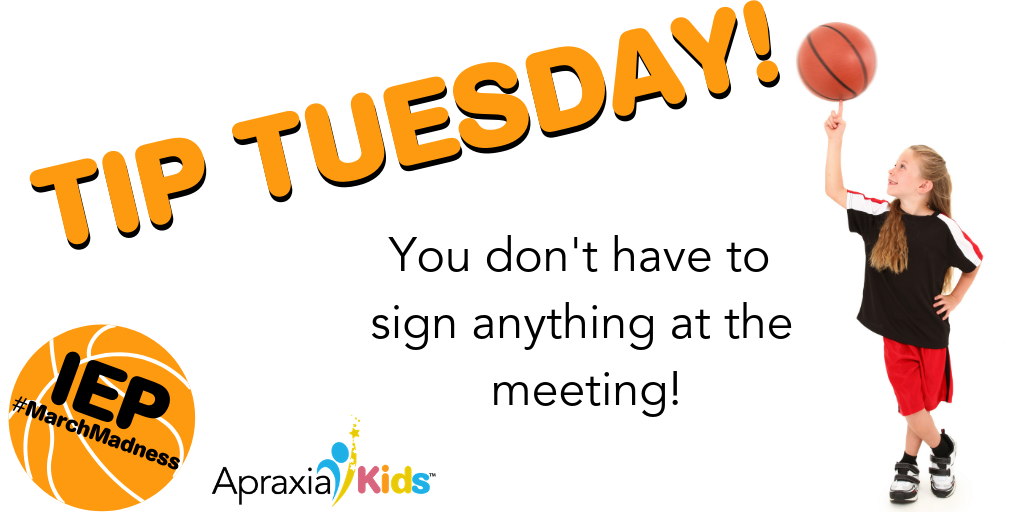
Tip Tuesday! Did you know that you don’t have to sign off on anything on your child’s IEP at the meeting? You can take the IEP home with you to review before signing, so you can consult with your child’s team of support before signing. Also, you can sign off on certain aspects of your child’s IEP and not others if there is anything you disagree with.
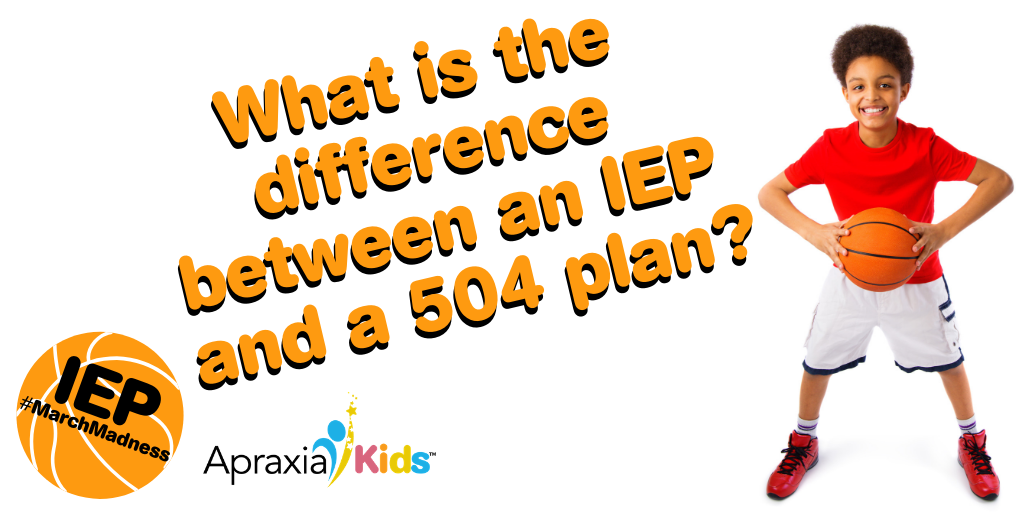
What is the difference between an IEP and a 504 plan? Both can offer formal help for K-12 students, but do have notable differences. For example, a 504 plan has a broader definition of “disability,” stating that a disability must substantially limit one or more basic life activities, such as learning. Because of this, a child who doesn’t qualify for an IEP might still be able to get a 504 plan.
Learn about all the differences between an IEP and a 504 plan, and download a sample 504 plan here:
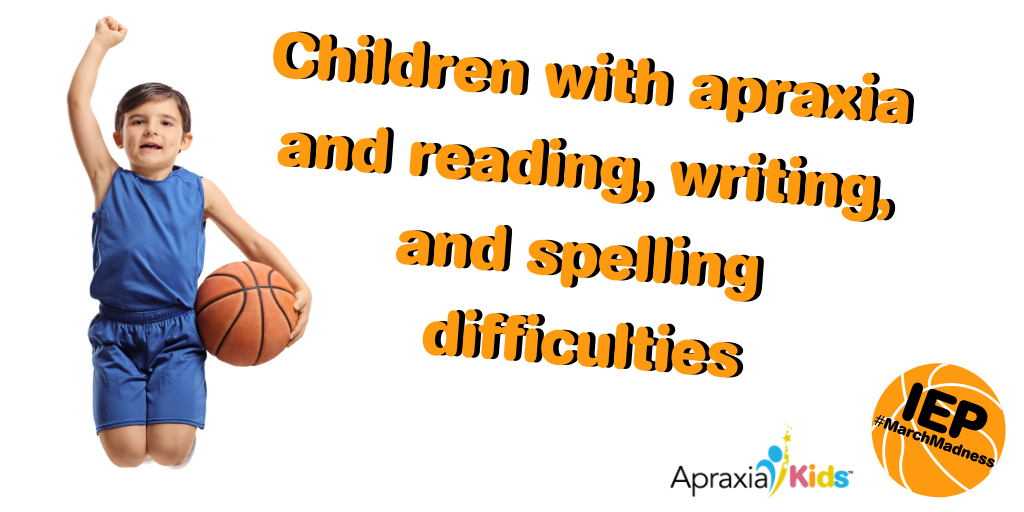
Children with apraxia of speech may also experience difficulties with reading, writing, and spelling. These challenges can have a significant impact on how your child functions in his or her class, and so they should be considered when thinking through your child’s IEP.
Check out this article for information you can bring to your child’s next IEP meeting:
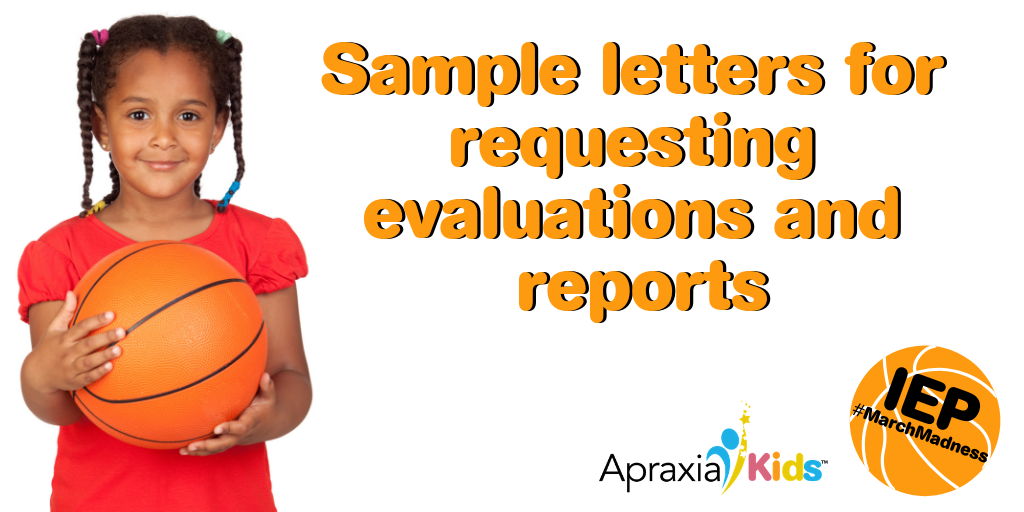
When you’ve decided to request a formal evaluation for special education services, it’s important to put your request in writing. Check out these sample letters for requesting evaluations and reports!
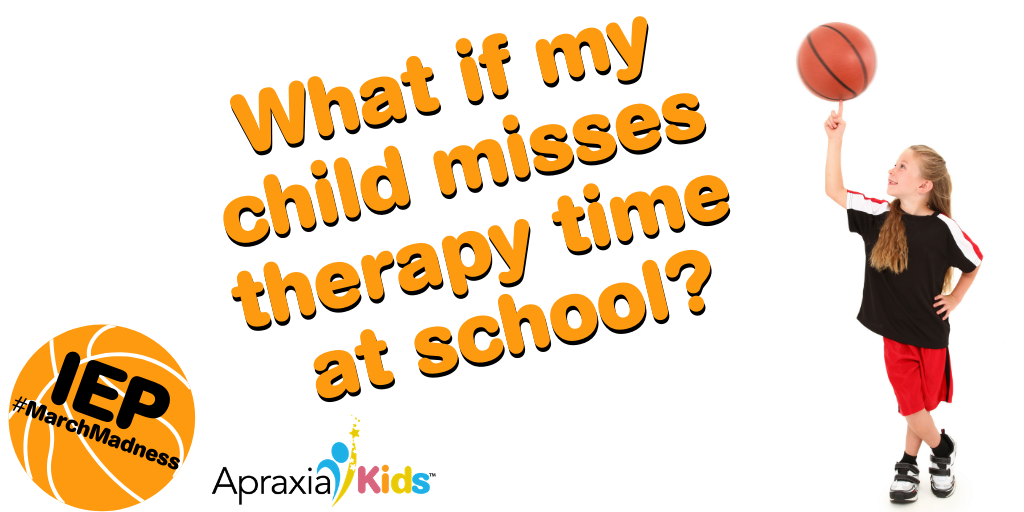
To ensure that your child is receiving their full therapy time, there are some steps you can take to make sure therapy isn’t missed if the child isn’t able to attend school on those days. First, you can be proactive and make sure that the number of therapy hours (and the way they are tracked) is included in the IEP.
Read a full list of tips here!:
https://adayinourshoes.com/can-missed-therapy-hours-school/
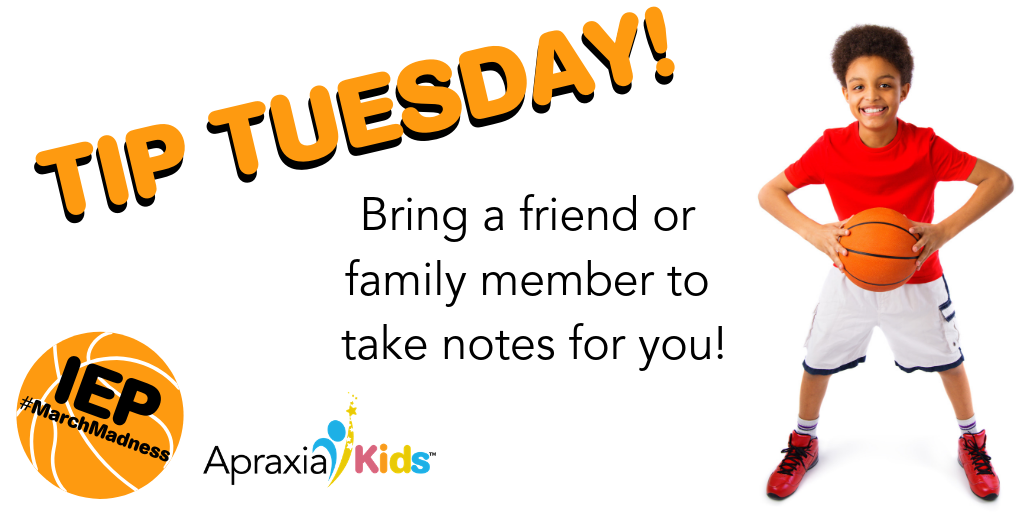
Tip Tuesday! Did you know you can bring a friend or family member to your child’s IEP meeting to take notes for you? This ensures you have a written record of everything that was discussed for you to refer back to, and you can focus on being attentive and asking questions to your child’s team.
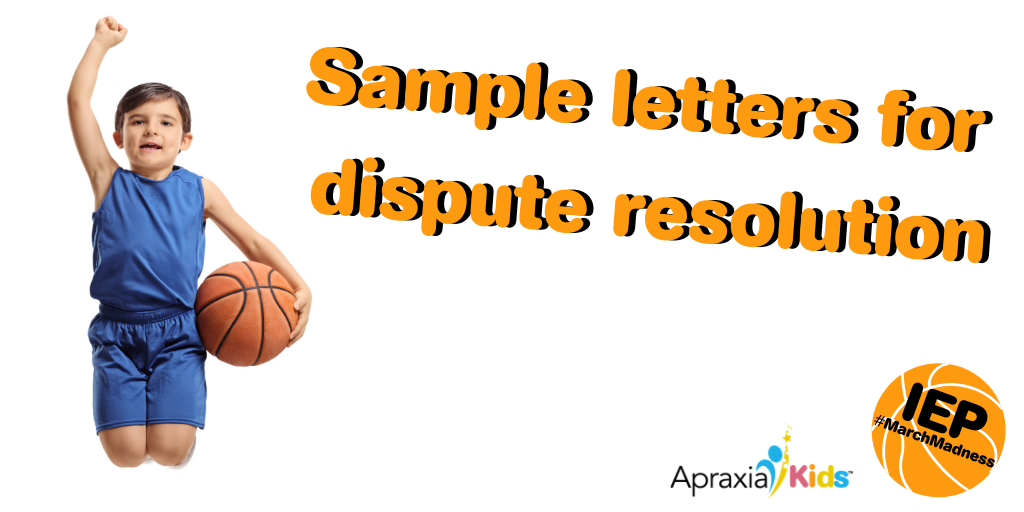
We know the importance of keeping a written record for everything to do with your child’s IEP, so it is best to also keep a record of any written correspondence with the school, especially during a dispute. Check out these sample letters for requesting an explanation for denial of services, requesting an IEP review meeting, following up on a request, and more!
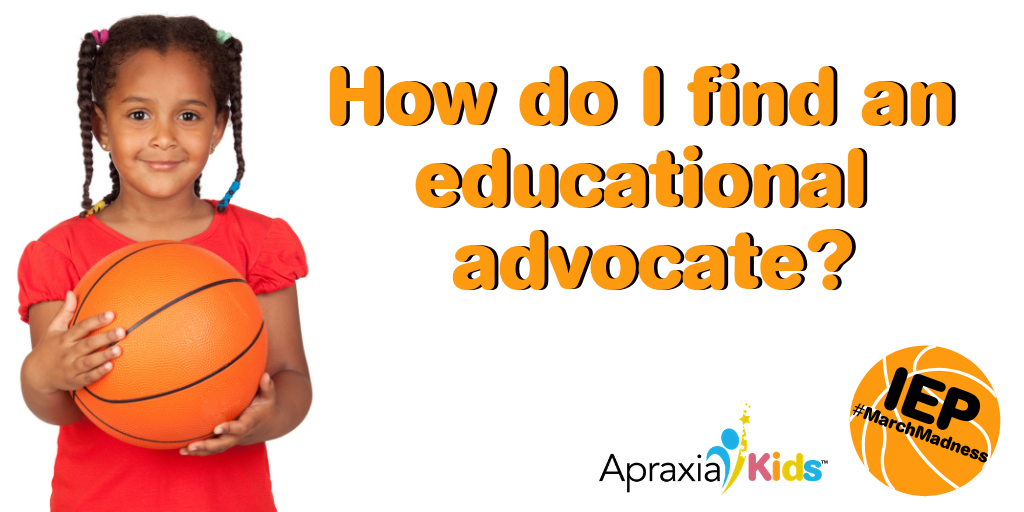
The IEP process can be stressful or confusing, so many parents seek the support of an educational advocate. Unlike an attorney, there is no formal licensing or certification for an advocate – so what are the things you need to consider when seeking out an advocate?
Read this article from Understood to learn about what questions you should be asking before hiring an educational advocate:
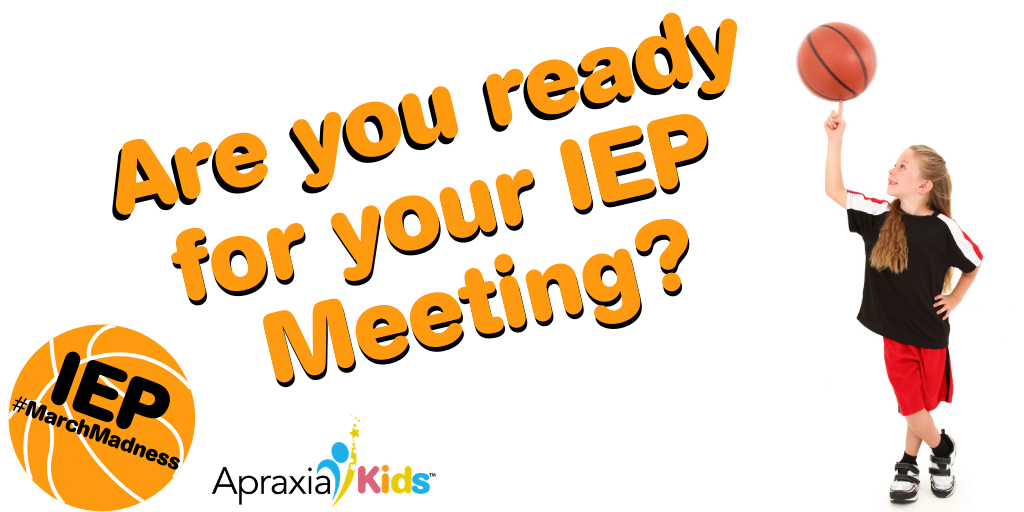
As IEP #MarchMadness is coming to a close, how do you know if you’re ready to walk confidently into your child’s IEP meeting? Check out this handy checklist overview of what to prepare before your next IEP meeting!
https://adayinourshoes.com/iep-meeting/
Want to join the conversation on IEPs? Join our Facebook Official Support Group to stay connected to our community!
IEP March Madness!
Apraxia Kids
It’s #MarchMadness and this month we are sharing TONS of information on IEPs on our social media! We’ve received overwhelming feedback about how helpful these posts have been to our social media followers, and wanted to compile them for parents to continue to use in the future! Check out this full list of helpful tips and resources to help you prepare for your child’s next IEP meeting!

What is an IEP? An individualized education plan (IEP) is a written plan that spells out the specific types of help that a student will receive. With an IEP, your child will get individualized instruction that focuses on improving specific skills, including accommodations and modifications.
Having an IEP gives you and your child certain legal protections, too. It allows you to be involved in decisions that impact your child’s education and learning goals.
Read more here: https://www.understood.org/en/school-learning/special-services/ieps/what-is-an-iep

“What can I expect from an IEP meeting?” This is a question that many parents ask prior to their first IEP meeting. Knowing who attends, what is discussed/decided, and what actions will be required before the meeting can help ease parents’ nerves.
Check out this guide that can help prepare you for what to expect from your first IEP meeting!
https://www.understood.org/en/school-learning/special-services/ieps/the-iep-meeting-an-overview

Tip Tuesday! We asked our community what their top-tips for IEP meetings are, and one common tip was, “Keep a written record of everything!” Additionally, if something is said at an IEP meeting, you can request that a written copy of any decision is provided to you.
Understood.org has a variety of free downloads, including an IEP Binder Checklist and a Communication Log. Check it out!
https://www.understood.org/en/school-learning/special-services/ieps/download-iep-binder-checklist

Where do I get started in advocating for my child? As a parent, your responsibility is to ensure that the decisions made are what is best for your child – but how do you know where to start?! This guided worksheet from Understood.org can help you organize your thoughts about what your child should be receiving through the schools. Writing down your thoughts prior to the meeting can help you clear your head and keep a record of everything you want to say during the meeting.

What is the difference between Federal Law and State Law? Every student who gets special education is covered by the Individuals with Disabilities Education Act (IDEA). That federal law spells out what all states must do to meet the needs of students with disabilities. But in many areas, IDEA leaves room for states to interpret the rules and pass their own laws on how to apply them.

What type of speech and language goals should be considered when planning an IEP for a child with apraxia? Learn more about how short and long term IEP goals should be written for children with apraxia of speech!
https://www.apraxia-kids.org/apraxia_kids_library/individualized-education-plans-ieps/

Tip Tuesday! Did you know you can request a copy of your child’s IEP ahead of time? This way, you can read over the IEP, ask opinions of your support network, and prepare questions before you arrive at the IEP meeting.

What do you do when your child’s teacher isn’t following the IEP? It’s a good idea to meet with the teacher as soon as possible, and make the meeting conversational rather than confrontational. If your meeting with the teacher is unsuccessful, you should document what has happened and raise your concerns to the school administrators.
Read more about how you can ensure that the IEP is being met: https://www.understood.org/en/school-learning/special-services/ieps/the-teacher-isnt-following-my-childs-iep-what-can-i-do

What do you do when you’ve asked for something to be included on your child’s IEP and the school says “We don’t do that here”? This mom shares her experience with being told no, and urges parents to take further actions if an appropriate request that is necessary for the child is being denied. Remember that the “I” in IEP means “individual,” so the school should provide individualized services when appropriate.
Read more!: https://adayinourshoes.com/what-to-do-when-school-says-we-dont-do-that-here/

The main law that covers special education is the Individuals with Disabilities Education Act (IDEA). IDEA requires schools to have what’s called an “agency representative” on the IEP team. This person is responsible for seeing that your child gets the supports and services as written in his or her IEP. If you don’t feel the school is following your child’s IEP, contact the agency representative or file a complaint with the state department of education.

“Should my child be privately evaluated or evaluated by the school?” There are pros and cons for considering who should evaluate your child. This full chart from Understood explains in detail everything you should consider:

What is the difference between accommodations and modifications? Accommodations change how a student learns the material. A modification changes what a student is taught or expected to learn.
How do accommodations and modifications impact different aspects of your child’s education, like classroom instruction, tests, art class, and more? Check out this full chart from Understood:

Tip Tuesday! Did you know that you don’t have to sign off on anything on your child’s IEP at the meeting? You can take the IEP home with you to review before signing, so you can consult with your child’s team of support before signing. Also, you can sign off on certain aspects of your child’s IEP and not others if there is anything you disagree with.

What is the difference between an IEP and a 504 plan? Both can offer formal help for K-12 students, but do have notable differences. For example, a 504 plan has a broader definition of “disability,” stating that a disability must substantially limit one or more basic life activities, such as learning. Because of this, a child who doesn’t qualify for an IEP might still be able to get a 504 plan.
Learn about all the differences between an IEP and a 504 plan, and download a sample 504 plan here:

Children with apraxia of speech may also experience difficulties with reading, writing, and spelling. These challenges can have a significant impact on how your child functions in his or her class, and so they should be considered when thinking through your child’s IEP.
Check out this article for information you can bring to your child’s next IEP meeting:

When you’ve decided to request a formal evaluation for special education services, it’s important to put your request in writing. Check out these sample letters for requesting evaluations and reports!

To ensure that your child is receiving their full therapy time, there are some steps you can take to make sure therapy isn’t missed if the child isn’t able to attend school on those days. First, you can be proactive and make sure that the number of therapy hours (and the way they are tracked) is included in the IEP.
Read a full list of tips here!:
https://adayinourshoes.com/can-missed-therapy-hours-school/

Tip Tuesday! Did you know you can bring a friend or family member to your child’s IEP meeting to take notes for you? This ensures you have a written record of everything that was discussed for you to refer back to, and you can focus on being attentive and asking questions to your child’s team.

We know the importance of keeping a written record for everything to do with your child’s IEP, so it is best to also keep a record of any written correspondence with the school, especially during a dispute. Check out these sample letters for requesting an explanation for denial of services, requesting an IEP review meeting, following up on a request, and more!

The IEP process can be stressful or confusing, so many parents seek the support of an educational advocate. Unlike an attorney, there is no formal licensing or certification for an advocate – so what are the things you need to consider when seeking out an advocate?
Read this article from Understood to learn about what questions you should be asking before hiring an educational advocate:

As IEP #MarchMadness is coming to a close, how do you know if you’re ready to walk confidently into your child’s IEP meeting? Check out this handy checklist overview of what to prepare before your next IEP meeting!
https://adayinourshoes.com/iep-meeting/
Want to join the conversation on IEPs? Join our Facebook Official Support Group to stay connected to our community!
Credentials:
Hours of Operation:
Treatment locations:
Address:
,
Phone:
Email:
Overall Treatment Approach:
Percent of CAS cases:
Parent Involvement:
Community Involvement:
Professional consultation/collaboration:
Min Age Treated:
Max Age Treated:
Insurance Accepted:




